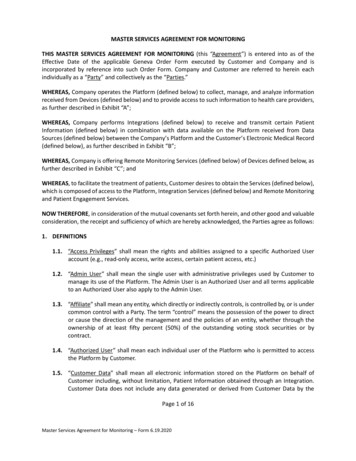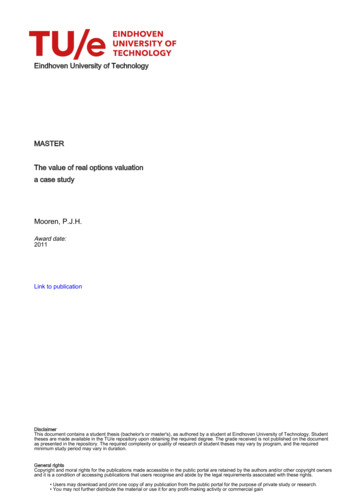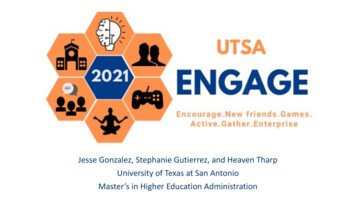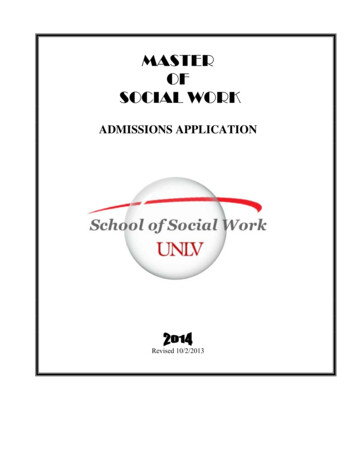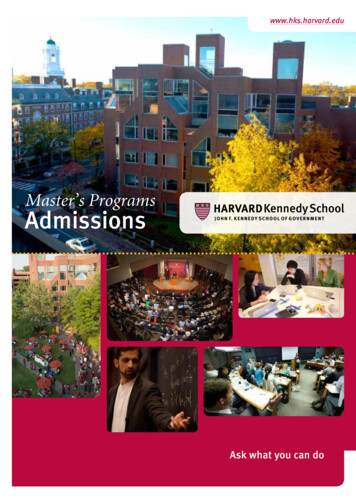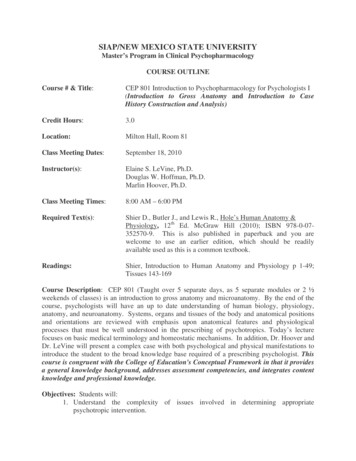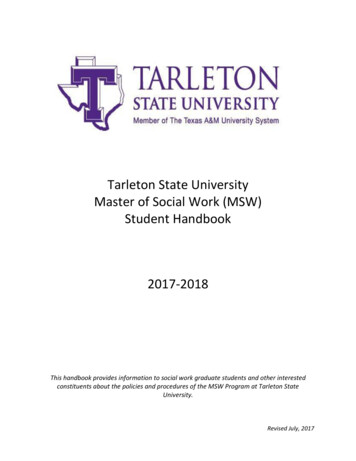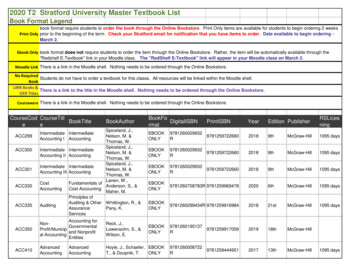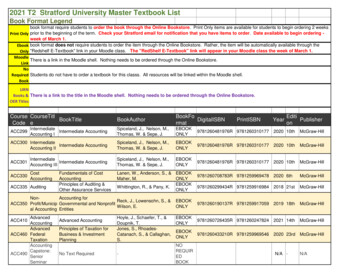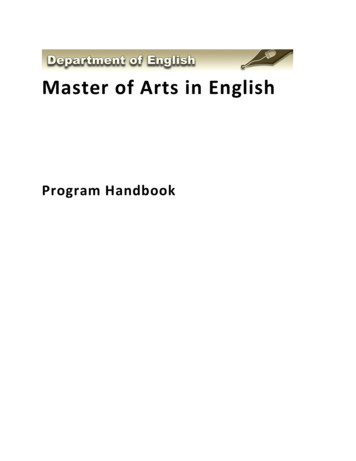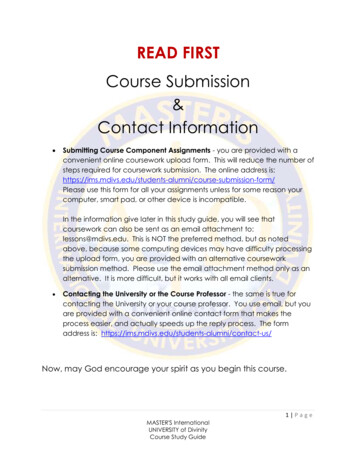
Transcription
READ FIRSTCourse Submission&Contact Information Submitting Course Component Assignments - you are provided with aconvenient online coursework upload form. This will reduce the number ofsteps required for coursework submission. The online address bmission-form/Please use this form for all your assignments unless for some reason yourcomputer, smart pad, or other device is incompatible.In the information give later in this study guide, you will see thatcoursework can also be sent as an email attachment to:lessons@mdivs.edu. This is NOT the preferred method, but as notedabove, because some computing devices may have difficulty processingthe upload form, you are provided with an alternative courseworksubmission method. Please use the email attachment method only as analternative. It is more difficult, but it works with all email clients. Contacting the University or the Course Professor - the same is true forcontacting the University or your course professor. You use email, but youare provided with a convenient online contact form that makes theprocess easier, and actually speeds up the reply process. The formaddress is: ow, may God encourage your spirit as you begin this course.1 PageMASTER'S InternationalUNIVERSITY of DivinityCourse Study Guide
"He will guide you into all truth" (John 16:13).MASTER'S InternationalUNIVERSITY of DivinityCourse Study GuideAdvanced Systematic Theology IAST-7013 credits2 PageHome Page http://www.ims.mdivs.edu/General Student Portal http://ims.mdivs.edu/students-alumni/
"He will guide you into all truth" (John 16:13).Master’s International University of Divinitywww.ims.mdivs.edu520 Kimber Lane, Evansville, Indiana 477151-800-933-1445 1-812-471-0611 1-812-471-0877 faxCopyright and all publication rights reserved.This study guide is accurate at the time of posting.A student who downloaded an earlier version may have slightly differentrequirements. In such a case, the student may elect to complete either therequirements of this study guide (recommended), or the earlier version.3 PageHome Page http://www.ims.mdivs.edu/General Student Portal http://ims.mdivs.edu/students-alumni/
"He will guide you into all truth" (John 16:13).Welcome to this course! The completion of this course will prove to be asignificant blessing to you both academically and spiritually. We recommendthat you thoroughly read the entire study guide before you actually beginworking on the Course Projects. If you are uncertain or unclear on any matter,contact the University for clarification (1-800-933-1445 1-812-471-0611 lessons@mdivs.edu). Above all other things, we encourage you to pray forGod’s guidance before you begin this course, and each time you work on it.Become totally familiar with the Master's Online Digital Library, and make ampleuse of its resources throughout this course. The address is: http://odl.mdivs.edu.You will need your student ID# and a password. This information was sent to youshortly after your initial enrollment. Contact Master's if this has been misplacedor forgotten.Follow the instructions given later in this study guide related to course formattingand submission. You may also refer to your original Student Orientation Page.IMPORTANT: The instructions on the study guide always supersede any otherinstructions. If there seems to be a conflict between this study guide and otherinstructions, always follow the instructions on the study guide.Your Master's Student Portal is also a convenient place to get information onmost subjects related to your student status. Go to:http://ims.mdivs.edu/students-alumni/We strongly recommend that you use reliable word processing software andmake frequent use of the spell checker and grammar suggestion aspects. Besure to save your work frequently, and back up your files! Master’s cannot beresponsible for keeping backup copies of course work you have submitted.If you need to contact the professor for this course (or the academic office), werecommend that you do so first by email. If the professor’s email address is notlisted on this study guide you may request it by email: lessons@mdivs.edu.The total length of time required to complete this course is different for eachperson. This is because already acquired knowledge of the subject, previouseducation, and personal situations all influence study habits and ability.4 PageHome Page http://www.ims.mdivs.edu/General Student Portal http://ims.mdivs.edu/students-alumni/
"He will guide you into all truth" (John 16:13).However, on average, one course credit usually requires between 35-40 clockhours of study. For example, a three-credit course will require between 105-120hours. Since you are not restricted by classroom hours, on average you mightexpect to complete a three credit course in about eight to nine weeks bydevoting four study hours per day four days per week (i.e. two hours morningand evening). Obviously, these are only general estimates, bearing in mindpersonal study habits and differing course requirements.The time between the submission of your coursework, until it is returned to you(graded) will vary, but generally courses sent by postal mail may require asmuch as two weeks in transit (to and from), and another two weeks to getthrough the recording and grading process. Email submissions (preferred)generally require about two weeks. These are only averages.Some courses require a final proctored written final summative exam. If soinstructions will be included, further down in this study guide. Be sure to followvery carefully these instructions, and contact the University if you have. If nofinal exam is required, there will be no instructions given.Please keep the University informed if you change your email, postal mailingaddress or telephone numbers.Students with DisabilitiesStudents with documented disabilities who may need specialinstructional accommodations should notify the University.May God bless you in your studies, and as you follow the timelessencouragement given by the Apostle Paul as recorded in II Timothy 2:15, “Studyto shew thyself approved unto God, a workman that needeth not to be to beashamed, rightly dividing the word of truth.”Also, his words in Galatians 6:9, “And let us not be weary in well doing: for in dueseason we shall reap, if we faint not.”5 PageHome Page http://www.ims.mdivs.edu/General Student Portal http://ims.mdivs.edu/students-alumni/
"He will guide you into all truth" (John 16:13).GENERAL INFORMATIONIdentifying Course Projects - This study guide contains assignments that arerelated to the required textbook(s), instructional materials, lectures (if any),online or off-line research, as well as optional books along with other coursematerials. The combination of these assignments is called a Project or anAssignment.You will complete Projects and/or Assignments for this course then be instructedas to how to submit these for grading. About half way through most courses,you will be asked to complete a Self-guided Personal Assessment. Thisassessment is not to be submitted for grading, but is designed to assist you inrecalling and reaffirming your learning experience up to that point.After you have completed the requirements for this course (if so required), youwill be ready to take your final proctored summative exam (not all coursesrequire a final written exam. Follow the instructions. If there are no suchinstructions, then this course is not one that requires a final proctored exam.Instructional Methods - All of the distance education courses at Master’s aretaught using a variety of instructional methods including reading (lectures insome cases), research (both online and off-line in some cases), self-directedstudy, demonstration of comprehension through project creation andassessment, a self-directed mid-course personal assessment, and in some cases,a final proctored summative examination.6 PageHome Page http://www.ims.mdivs.edu/General Student Portal http://ims.mdivs.edu/students-alumni/
"He will guide you into all truth" (John 16:13).Course InformationInstructor: Dennis D. Frey, Th.D.More information about your professor may be found on the faculty pagelocated online at: http://ims.mdivs.edu/team/.Contact Information for your professor:Email address: drfrey@mdivs.eduPhone number: 1-812-471-0611Course Purpose:This advanced level course presents the doctoral student with the fundamentalissues of Systematic Theology and how these relate to the Bible as afoundational source. In doing so, the course will introduce and expose thestudent to the study of Christian doctrine within a coherent framework; toenable the student to identify and describe key doctrinal issues; to apply thatknowledge in the student's current ministry and to lead the student to analyzecarefully the various theological options on key doctrinal issues; to examinethose issues in light of her/his own theological stance; to relate doctrinal truths toa coherent system of thought consistent with the student's own faith tradition.Course Objectives:1.2.3.4.To introduce the fundamental issues of Systematic Theology, and therelationship these have to the study of Theology so that the student canidentify key doctrinal issues and describe the relationship between thoseissues and a coherent system of truth.To lead the student to interpret the relevant doctrinal issues and todistinguish theological systems.To enable the student to explain the truths of Systematic Theology as theyrelate to the Bible and to illustrate these in light of her/his own theologicalcommitment.To provide the student an opportunity to utilize the doctrines studied andrelate them to authentic ministry opportunities, and determine her/hisrelationship to the theological system.7 PageHome Page http://www.ims.mdivs.edu/General Student Portal http://ims.mdivs.edu/students-alumni/
"He will guide you into all truth" (John 16:13).MATERIALSREQUIRED PRINTED MATERIALS: (Purchased from Master's by the student)*Systematic Theology in One Volume, by Norman Geisler, ISBN: 0764206036, ISBN13: 9780764206030, published by Bethany House, 2011.* This textbook is also available for immediate download from atic-theology. There you will find itin the standard four volume format. Since this textbook is also used in the courseAdvanced Systematic Theology II AST-702, you may wish to consider the overallvalue of purchasing it from Logos.com.Basic Questions in Theology, Volume I, by Wolfhart Pannenberg, ISBN:0800662563, ISBN-13: 9780800662561, published by Augsburg Fortress, 2008.COURSE COMPONENT NUMBER ONEYOUR FIRST TEXTBOOK PROJECT:Part One: Read Parts One through Four of the textbook Systematic Theology inOne Volume, by Norman Geisler, and write a one-paragraph affirmation thatyou have read the required textbook. Include a simple reading log detailingthe dates and time of your reading. Include a basic reading log of the timespent reading this book.NOTE: If you are using another version of this textbook (such as the Logoselectronic version, you may Parts One - Four in only two volumes. In that case,here are the areas you are to cover in this assignment:1. Introduction (Prolegomena)2. Bible (Bibliology)3. God (Theology Proper)4. Creation8 PageHome Page http://www.ims.mdivs.edu/General Student Portal http://ims.mdivs.edu/students-alumni/
"He will guide you into all truth" (John 16:13).Part Two: Immediately after you have completed the reading of the textbook,write a paper of not less than 750 words (about three full pages) expressing theway in which the reading of the book has changed or more deeply confirmedyour core beliefs about the existence of God and the trustworthiness of theBible. This paper should be thoughtful and personal.Part Three: The following exercise is designed to assist you in comprehendingand expressing a “wider and more general” understanding of the foundationalrequisites of the study of Theology and Bibliology.In the Table of Contents you will observe that the required portion of thistextbook is divided into Part One through Part Four, with Chapter and Sectionsubheadings. These actually serve as very brief summary statements for thelogically divided elements of Part One and Part Two. The following assignmentwill be taken from these Chapters and Sections.A. EXAMPLE: Part One: Introduction (Prolegomena), write out each of theChapter titles (Chapter One: Introduction; Chapter Two: God: TheMetaphysical Precondition; and so forth). Under each of the Chaptertitles, create a concise outline that touches on the core teaching of thatChapter. Do this for each of the Chapters. You may elect to use anyoutline form and level that you prefer.B. Repeat this assignment for Parts Two - Four.NOTE: If you are using another version of this textbook (such as the Logoselectronic version, you may Parts One - Four in only two volumes. In that case,here are the areas you are to cover in this assignment:1. Introduction (Prolegomena)The Subheading (Chapters) under this section.2. Bible (Bibliology)The Subheading (Chapters) under this section.3. God (Theology Proper)The Subheading (Chapters) under this section.4. CreationThe Subheading (Chapters) under this section.9 PageHome Page http://www.ims.mdivs.edu/General Student Portal http://ims.mdivs.edu/students-alumni/
"He will guide you into all truth" (John 16:13).YOU ARE NOW READY TO SEND THE FIRST COMPONENT OF THIS COURSE FOR GRADING.REFER TO THE SUBMISSION INSTRUCTIONS AT THE END OF THIS STUDY GUIDE. Next, youwill complete your Mid-course Self Directed Assessment, after which you will begin theSecond Component of this course.10 P a g eHome Page http://www.ims.mdivs.edu/General Student Portal http://ims.mdivs.edu/students-alumni/
"He will guide you into all truth" (John 16:13).MID-COURSE SELF- DIRECTED ASSESSMENT TOOLThis Self-directed Assessment Tool is provided to serve you in two ways.First, this tool is a vehicle for you to use to go back over the work you have completedup to this point by solidifying terms, concepts, and knowledge that you haveencountered along the way.Second, it helps you to stay focused on your work because all of your course work forthe First Component of this course must be submitted for grading prior to beginning thisassessment. In this way, as a result of grading the First Component of this course, yourgrading instructor can better understand where you may need assistance as you goforward. If there are any serious concerns, you will be contact right away.You should also take this time to contact the University if you need to ask questions orclarify points of concern. Remember, if you are encountering difficulties, it is yourresponsibility to contact us: http://ims.mdivs.edu/students-alumni/contact-us/We are here to assist you!The Mid-term Self-Directed Assessment Instructions:1. Go back through the work that you have just submitted for grading. Re-readyour own work, looking for areas where you may still feel unclear or uncertain.2. After identifying areas where you may feel unclear or uncertain, return to thesection of the textbooks or other resources where that information is to befound.3. Locate the area(s) of your concern, and attempt to clarify and strengthen yourunderstanding of the issue(s).4. If you are still not satisfied, contact your professor for the course or the Universityfor assistance. We recommend that you do so first by email. If the professor’semail address is not listed on this study guide you may request it by email:lessons@mdivs.edu.11 P a g eHome Page http://www.ims.mdivs.edu/General Student Portal http://ims.mdivs.edu/students-alumni/
"He will guide you into all truth" (John 16:13).5. Finally, consider the length of time it has taken you to complete the FirstComponent of this course. Are you satisfied with your time management, studyhabits, location of study (home, office, library, etc.)? Do you feel you havesufficient resources? Have you made good use of the Master's Online DigitalLibrary http://odl.mdivs.edu? In what ways are you able to improve your studyhabits and conditions? Did you actually stop to pray before you started eachstudy session, and did you prepare your mind and spirit to undertake the task?Are you sharing what you have learned with others?6. Are you satisfied with the quality of your work, including English composition,logic, topic concentration (staying on message), and the general quality of yourscholarship?7. Whatever things are working to the benefit of your study ought to be continued,and whatever things may be hindering your study ought to be reassessed andwherever possible, adjusted in your favor.You are now ready to begin Course Component Two (you do not need to wait untilyou receive a grade for the First Component). If your grading professor determinesthere is a significant cause for concern, you will be contacted.12 P a g eHome Page http://www.ims.mdivs.edu/General Student Portal http://ims.mdivs.edu/students-alumni/
"He will guide you into all truth" (John 16:13).COURSE COMPONENT NUMBER TWOPart Four: In the Appendices of Systematic Theology in One Volume , read thefollowing Appendices: 2 - Biblical References to Creation3 - Various Views of the "Days" of Genesis4 - The Age of the Earth5 - The Scientific Evidence for CreationWrite a paper of about 1,000 words (four to five pages) in which you discuss youragreements and/or objections to Dr. Geisler's presentation of creation in thesefour Appendices.YOUR SECOND TEXTBOOK PROJECT:Part One: Read the textbook Basic Questions in Theology, Volume I, by WolfhartPannenberg, and write a one-paragraph affirmation that you have read therequired textbook. Include a simple reading log detailing the dates and time ofyour reading. Include a basic reading log of the time spent reading this book.There are no additional assignments for this textbook.YOUR RESEARCH PROJECT:From either textbook, select one theological issue related to either the existenceof God or the inerrancy of the Bible that you believe has had a major positiveand one that has had a major negative impact on modern Christianity. Discussthese two issues. Use not less than 1,000 words for each of these two issues.YOUR FINAL WRITING PROJECT:This is the final project, and must be completed only after you have finished allof the other Projects. Write a summary of the entire course. Include in thesummary how this course has impacted your understanding of the subjectsstudied; has helped you in your ministry to others; and how this understandinghas changed the way you think and react in matters related to the subjectsstudied in this course. Use not more than 750 words (about three full pages).13 P a g eHome Page http://www.ims.mdivs.edu/General Student Portal http://ims.mdivs.edu/students-alumni/
"He will guide you into all truth" (John 16:13).YOU ARE NOW READY TO SEND THE SECOND COMPONENT OF THIS COURSE FORGRADING. REFER TO SUBMISSION INSTRUCTIONS AT THE END OF THIS STUDY GUIDE.You are now ready to complete your proctored open book final written summativeessay exam.IV.PROCTORED FINAL SUMMATIVE ESSAY EXAM PROJECTGeneral Instructions: Immediately after sending the second Project for grading, youshould select someone to be the proctor for your final summative exam.Proctor Qualifications: Must be age 25 or older, and not related by blood or marriage to thestudent.Must be a recognized member of the clergy (or retired). Examples:pastor, associate pastor, missionary, evangelist, director of worship, choirdirector, minister to (youth, seniors, women, men, etc.), chaplain (military,hospital, other), Christian school or college level administrator or faculty.Or a Christian serving in (or retired from) secular education at the facultyor administrative level.Must have an email address.Must know how to access and use the Internet.We must be able to confirm ministry status by one of the followingmethods: by our visiting a personal web site or the web site of a ministrywhere the proctor is identified; by confirming an address through one ofthe online white page services; by contacting personally by telephone.Proctor Duties: Several days prior to the exam, receive by email the web site address forboth the final exam form, and the examination.Must have email and Internet access at the location where the studentwill complete the exam.14 P a g eHome Page http://www.ims.mdivs.edu/General Student Portal http://ims.mdivs.edu/students-alumni/
"He will guide you into all truth" (John 16:13). Must be able to assure that the student will have access to a computerwith word processing features and connection to the Internet (studentmay bring his or her own computer).Remain with the student during the examination at any suitable location,and initiate the start and finish of the exam.Proctor will be asked to log in and out of the online exam form (will needaccess to the Internet and email).Proctor Selection and Exam Request Process: Make personal contact with an individual who meets the abovequalifications and is willing to serve as your proctor.Send the person the following Internet link to the Proctor Approval andValidation Form: , andask that they complete the form as soon as possible.Master’s will notify you and the proctor by email if they are approved (ifdisapproved the reason why).Once the proctor has been approved you must agree on a place andtime for you to take the exam.When you are ready to take the exam, you must email Master’srequesting that the web address for your exam be sent to your proctor.Send your request to: finals@mdivs.edu. DO NOT send this request to anyother email address.You should request that your exam link be sent to your proctor about tenworking days prior to the date you expect to take the exam in order toassure that the exam will be available to you on the date you haveselected for completion.Though it will probably take you between two to three hours to finish yourexam writing, you must do so in not more than five (5) hours.Here is a Sample of What You Can Expect the Day of the Examination:PROCTOR INSTRUCTIONS(To be read by the student also.) Ask the student to present you with some official form of photoidentification (driver's license, etc.), unless you are already personallyacquainted with the student.Give the final exam address to the student, and instruct the student toaccess the final exam address online. If you and the student are sharing a15 P a g eHome Page http://www.ims.mdivs.edu/General Student Portal http://ims.mdivs.edu/students-alumni/
"He will guide you into all truth" (John 16:13). computer, you will need to switch back and forth between this page andthe exam file. Otherwise, the student may wish to read these instructionson your computer, and only open the exam on the computer the studentis using.Confirm that the student is able to access the exam file.The student should read all of the exam instructions on the exam file, andthe Student Instructions on this page, and also read your instructions. Thiswill help to assure that the student has all of the information required totake the proctored examination.Confirm that the student has all of the resources needed.Confirm that the student knows his or her student ID number.This is an open book and open resource exam. The student may use anyresource in print, digital or online.There is a maximum time limit of five (5) hours. The student may not writebeyond that time. The student may take breaks as often as required, butthe break times count toward the five hour limit.At this time, complete the proctor information.Ask the student to complete the student information.Do not allow the student to begin writing the exam until you are confidentthat all instructions have been read and understood.When the student is ready to begin, fill in the exam start time and date.When the student completes the exam, fill in the exam stop time anddate.Confirm that the student has sent the file transfer of the written exam tofinals@mdivs.edu.Confirm that the student has made provision for a back-up copy of theexamination.STUDENT INSTRUCTIONS This is an open book and open resource examination. You may find it ahelpful resource to have a copy of your completed coursework for thiscourse. However, the writing must be your original work, and completedonly at the time of this examinationBe very careful to cite sources for all quoted and referenced materials.You may use whatever writing style you prefer, but be consistent.Your proctor will provide you with access to the web page address of yourfinal written summative exam.Read the exam instructions carefully.16 P a g eHome Page http://www.ims.mdivs.edu/General Student Portal http://ims.mdivs.edu/students-alumni/
"He will guide you into all truth" (John 16:13). IMPORTANT: You must save this file to the computer you are using. Click"Save As" and add your Student ID Number to the front of the file name.For example: If the exam file is "Exam-NT-501.rtf" and your student numberis MDS001234, you would Save As "MDS001234Exam-NT-501.rtf".Keep the file in the Rich Text Format (.rtf). Do not change file formats. Thisentire process is nearly identical to the way you have previously beensending your regular course work.Fill in the required personal information at the top of the exam.Notify your proctor when you are ready to begin. Your proctor will fill inthe start time and date. While there is no minimum time limit, you may notwrite beyond five (5) hours. Your proctor will notify you if you approachthe five hour limit. You may take breaks as often as required, but thebreak times will count toward the five hours.When you are finished, spell check and read over your work. Make anychanges or corrections as may be prudent. You will be graded on acombination of recall, comprehension, content, logic and Englishcomposition.Save your work frequently as you write.Notify your proctor when you are finished. Your proctor will fill in the stoptime and date.Save your work one last time.Double check the file name, and upload the file to: finals@mdivs.edu.You may do this by clicking on the address or keying it into any emailclient.In the subject line place: "Final Examination for (name and number of thecourse)."In the body of the email, provide your name and student ID number.Attach your exam file to the email and send.Be sure to make provisions for a back-up copy of your final written exam.In the unlikely event that your file transfer was unsuccessful, you will berequired to resubmit the exam.You will be notified if there are any issues or concerns regarding the grading ofyour examination. Otherwise, your final exam will be graded within two to threeweeks from the time it is received.YOU ARE NOW READY TO REQUEST THE PROCTORED FINAL WRITTEN SUMMATIVE EXAM.BE SURE TO FOLLOW THE INSTRUCTIONS NOTED ABOVE. Be certain that your proctor hasbeen approved and the date and time of your exam has been confirmed.17 P a g eHome Page http://www.ims.mdivs.edu/General Student Portal http://ims.mdivs.edu/students-alumni/
"He will guide you into all truth" (John 16:13).GENERAL INFORMATION ON HOW TO SUBMIT YOUR COURSEWORKRead Me 1 of 6ALL COURSES SENT ONLINE MUST BE IN THE FOLLOWING FORMAT:ALL course assignments MUST be completed in the form of a single documentfile transfer attached to an email message. DO NOT paste your assignments intothe body of the email message. Be sure the assignment is attached as a singlefile transfer. ALL assignment files must be sent in either one of two forms:1. Microsoft Word - or - 2. Any form of text (such as ASCII, Text Only, RTF, Text,etc.). Assignments submitted in unreadable formats will be returned forresubmission in the proper format. Send your assignments to lessons@mdivs.edu.MAKE BACK UP COPIES OF EVERY COURSE!TIP: You may create your lesson in your favorite word processor, and when yousave it, select "Save As," and then select: .doc, .docx, .rtf, .txt. Remember, allthe text types are simple, clean and easy way of submitting your courses.HOWEVER, only the .rtf format is likely to retain all or most of the text formattingthat you may have worked so hard to produce. THEREFORE, if you are notsubmitting your coursework in Microsoft Word (recommended), we stronglysuggest that you save to .rtf formatting.DO NOT SEND COURSES IN ANY OTHER FILE FORMAT. DO NOT SEND COURSES ASA ZIP FILE. In only rare cases will you be instructed to sent course components inmultiple files. Unless instructed to do so, always send a completged coursecomponent as a single file with all of the projects and assignments for thatcomponent saved within a single file. Courses not sent according to theseinstructions may be refused and a request will be made for resubmission.Read Me 2 of 6THIS INFORMATION IS ONLY FOR STUDENTS WHO MUST PRINT THEIR COURSESUBMISSIONS AND SEND THEM BY POSTAL MAIL, AND FOR THOSE FEW COURSESTHAT REQUIRE THAT THE COURSE BE SENT BY POSTAL MAIL.Most of the instructions for sending courses apply whether you print and mailyour courses or elect to send them online.18 P a g eHome Page http://www.ims.mdivs.edu/General Student Portal http://ims.mdivs.edu/students-alumni/
"He will guide you into all truth" (John 16:13).When printing be sure to print on only one side of the page, but be sure thatyour name, student number and the name plus number of the course is printedon each page (header or footer is acceptable).If you wish to have us return your graded course, you must include with yoursubmission a return envelop of sufficient size and affixed with sufficient postageto allow us to return your graded course. If you forget to do this, your studentaccount will be charged for the cost of shipping and handling. Send yourcourse submissions to: Master’s International University of
Basic Questions in Theology, Volume I, by Wolfhart Pannenberg, ISBN: 0800662563, ISBN-13: 9780800662561, published by Augsburg Fortress, 2008. COURSE COMPONENT NUMBER ONE YOUR FIRST TEXTBOOK PROJECT: Part One: Read Parts One through Four of the textbook Systematic Theology in O
